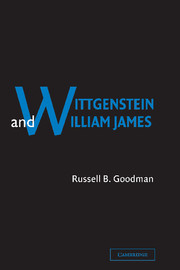Book contents
- Frontmatter
- Contents
- Preface
- Abbreviations
- Introduction
- 1 Varieties of Pragmatic Experience
- 2 Wittgenstein and The Varieties of Religious Experience
- 3 Wittgenstein and The Principles of Psychology: An Introduction
- 4 What Is It Like to Be a Human Being?
- 5 Language and Meaning
- 6 Pragmatism Reconsidered
- Coda
- Notes
- Index
5 - Language and Meaning
Published online by Cambridge University Press: 23 July 2009
- Frontmatter
- Contents
- Preface
- Abbreviations
- Introduction
- 1 Varieties of Pragmatic Experience
- 2 Wittgenstein and The Varieties of Religious Experience
- 3 Wittgenstein and The Principles of Psychology: An Introduction
- 4 What Is It Like to Be a Human Being?
- 5 Language and Meaning
- 6 Pragmatism Reconsidered
- Coda
- Notes
- Index
Summary
“What am I after? The fact that the description of the use of a word is the description of a system, or of systems. – But I don't have a definition for what a system is.” – Ludwig Wittgenstein, Last Writings on the Philosophy of Psychology, Vol. 1
“So is the experience of meaning a fancy? Well, even if it is a fancy, that does not make the experience of this fancy any less interesting”
(RPP, 355).Wittgenstein's criticisms of James on language – particularly in Philosophical Investigations – are easy to spot, but the pervasive overlap of themes, examples, and methods there and in other work is less obvious. Wittgenstein criticizes James (among others) for confusing meanings with feelings, and for the credulity he exhibits in his discussion of a Mr. Ballard, a deaf mute who claimed to have been able to think before he could speak. Wittgenstein also considers, again in a critical spirit, James's discussion of a word on the tip of one's tongue, concluding that James thinks of it as a peculiar experience, when it is really “not experience at all” (PI, p. 219).
Many of Wittgenstein's criticisms of James are of a piece with those he makes of the “if-feeling,” which we considered in Chapter 3. Wittgenstein charges James with a fundamental failure to distinguish experience from “grammar,” “meaning,” or “logic.”
- Type
- Chapter
- Information
- Wittgenstein and William James , pp. 119 - 149Publisher: Cambridge University PressPrint publication year: 2002

